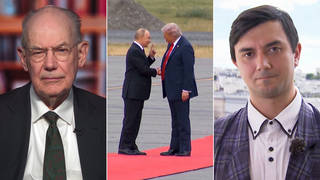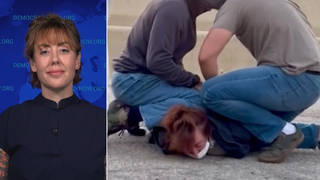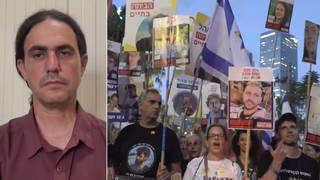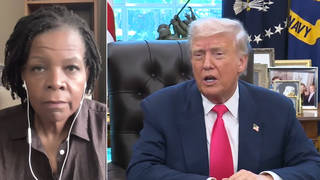
Topics
President Bush promoted Elliott Abrams to be his deputy national security adviser. Abrams played a key role in the Iran-Contra scandal and pleaded guilty in 1991 to withholding information from Congress. We speak with veteran investigative journalist Robert Parry who exposed Iran-Contra in the 1980s. [includes rush transcript]
President Bush promoted Elliott Abrams to be his deputy national security adviser. He will be responsible for pushing Bush’s strategy of advancing democracy abroad–a central theme in the president’s inaugural address and his State on the Union.
Abrams is a special assistant to the president and was an assistant secretary of state in the Reagan administration. He played a key role in the Iran-Contra scandal and pleaded guilty in 1991 to withholding information from Congress.
- Robert Parry, veteran investigative journalist and author of the new book “Secrecy & Privilege: Rise of the Bush Dynasty from Watergate to Iraq.” For years he worked as an investigative reporter for both the Associated Press and Newsweek magazine. His reporting led to the exposure of what is now known as the “Iran-Contra” scandal.
Transcript
AMY GOODMAN: Bob Parry joins us, veteran investigative journalist, author of a new book called, Secrecy and Privilege: Rise of the Bush Dynasty from Watergate to Iraq. For years, an investigative reporter with Associated Press and NewsWeek. His reporting led to the exposure of the Iran-Contra affair. Welcome to Democracy Now!, Bob.
ROBERT PARRY: Thanks, Amy.
AMY GOODMAN: Can you tell us who Elliot Abrams is?
ROBERT PARRY: Elliot is one of the true believers. He is one of the original neo-conservatives, back in the early 1980s when that was sort of a new concept. Elliot was someone who believed very strongly in the Cold War. He was first the Assistant Secretary of State for Human Rights under President Reagan, and then later became the Assistant Secretary of State for Latin America. In both cases he was very tolerant of some of the very aggressive use of human rights violations in Central America to thwart leftist insurgencies, in El Salvador and Guatemala, in particular. He tended to focus more on the alleged human rights violations in Nicaragua under the Sandinistas. In fact, I had an interview with him once where he was saying that the worst human rights abuses in Central America at the time were occurring in Nicaragua. I pointed out that there were a lot more people being killed in El Salvador and Guatemala, but he stressed that the thwarting of civil liberties, the repression of one of the newspapers in Nicaragua represented the kind of human rights violation that was in some ways more insidious. So, he was very much a true believer in using whatever means necessary to win the Cold War.
JUAN GONZALEZ: Bob, talk to us a little bit about what particularly was his role in the Iran-Contra scandal, and what he plead guilty to.
ROBERT PARRY: Well, Juan, he was in the job running the State Department’s coverage of Central America at the time when Ollie North, who was then over at the National Security Council, was running the secret war against the Sandinistas in Nicaragua, support for the so-called Contra Movement that had been banned by Congress. There was something called the Bolen Amendment which prohibited this support going to the Contras. They were seen also as serious human rights violators. North continued that anyway, secretly. Elliot was privy to those secrets. After the Hasenfuss plane, the plane that was shot down in Nicaragua, and one survivor was Eugene Hasenfuss, and he began talking in October of 1986 about his involvement with this operation and the support from the White House. When Congress asked Elliot Abrams about these allegations, Abrams gave very deceptive testimony. He tried to be very narrowly accurate but was highly misleading and tried to create the impression that the White House was unaware of any such operation being run by Oliver North. So, that became the basis eventually after the Iran-Contra scandal broke wide open for bringing charges against Abrams. He eventually plead guilty to a lesser charge of withholding information from Congress.
AMY GOODMAN: So, it would not be fair to say he was convicted of perjury?
ROBERT PARRY: I think that would be a little strong. I think he certainly — that’s what he was doing. He was providing false testimony, but he did plead guilty to a lesser charge.
AMY GOODMAN: What happened to that charge?
ROBERT PARRY: He was one of the six Iran-Contra defendants who was given a pardon by President George H.W. Bush on Christmas Eve 1992. This is after the election as Bush was heading out of office. He pardoned Abrams and five others, in part to protect himself. People do not realize this, I think, but the Iran-Contra investigation had begun to turn onto President Bush. He was being investigated at that point by Lawrence Walsh, the Special Prosecutor, for himself withholding evidence on the Iran-Contra scandal. So, when Bush gave those six pardons, he effectively was preventing himself from being caught up in the scandal that was still going on.
JUAN GONZALEZ: Of those six that were pardoned, then, how many of them are back in government now or have new lives now under this administration?
ROBERT PARRY: Well, I think Elliot Abrams is the only one back in the administration directly. I think a number of them have moved on to other pursuits. Some have been involved in think tanks and other aspects of quasi-government life, but I think Abrams is the only one back in this administration.
AMY GOODMAN: Was John Poindexter involved?
ROBERT PARRY: Well, that is true. Poindexter was someone who was convicted. That is true. And Poindexter did come back in for a time at the Defense Department as part of that plan to have surveillance of all aspects of our personal lives, including how we purchase things, the so-called Total Awareness operation.
JUAN GONZALEZ: And Otto Reich, who was not actually among the indicted, but was identified as being involved in some of the hiding — propaganda information related to Iran-Contra, obviously came back for a while in and out in terms of helping to determine a Latin America policy now under Bush II?
ROBERT PARRY: Right. Otto Reich was head of the propaganda office. They called it the “Public Diplomacy Office for Latin America” at the State Department. That office was involved in what was called “white propaganda.” It was ultimately shut down. I think it was the only institutional casualty of the Iran-Contra affair. Congress required it to be shut down because of the illegal secret propaganda they were running against the American people. Reich came back into government with the second Bush administration, taking the job that Elliot Abrams once had, the Assistant Secretary of State for Latin America, but he has since moved on.
AMY GOODMAN: We are talking to investigative reporter, Bob Parry about Elliot Abrams, who has just been named to be Deputy National Security Adviser. Iran, that is a big topic now. The possibility of the U.S. moving in on Iran, possibly attacking Iran or Israel attacking Iran. Sey Hersh’s piece indicating U.S. military are already in Iran scoping out targets. What does it mean that someone like Elliot Abrams, who was involved in Iran in a very different way, the diversion of sales of weapons to Iran, and then taking that money and giving it to support the Contras illegally–is now, is in the ascendancy right now? How does Iran of then fit in with Iran of today?
ROBERT PARRY: As you recall, back in the 1980s the Reagan-Bush administration had a policy of treating Iran as a terrorist state, which meant that it was supposedly not getting any help from the United States. Secretly, however, the Reagan-Bush administration was shipping them weapons, as it was shipping or providing support for the Iraqis who were then engaged in a war with Iran. So you had the U.S. essentially secretly providing military assistance to both sides of the conflict. Some of the profits from the sales of the weapons to Iran were then diverted to help the Contras, who were in need of money because of the Congressional cut-off.
I think that the main point, though, of Elliot’s re-emergence here, is his attitude toward being basically, “the ends justifying the means,” which is what we saw in his behavior around Central America. Even the most severe human rights violations were somewhat excused or tolerated in the name of fighting the Cold War. And I think now the war on terror has taken on a similar cast where virtually anything can be tolerated as long as it advances that cause. I guess they would put it more positively as the cause of spreading democracy, but I think those kinds of extreme measures to achieve the ends would be part of what Elliot Abrams brings to the table, certainly a willingness to look the other way when horrendous acts occur, as long as they are helping to achieve a larger goal.
AMY GOODMAN: Bob Parry is our guest. We have just twenty seconds. You wrote an interesting piece, not related to this, but on the Iraq elections. Could you just summarize your thoughts?
ROBERT PARRY: Well, I think there are different sides to this. Clearly, anytime democracy expands, one has to be somewhat pleased with that, but elections themselves don’t really mean democratic freedom. That requires a lot more in terms of people’s ability to debate, discuss, have free newspapers and so forth. So, but I think in the case of Iraq, the situation with the U.S. military might be that the U.S. military could now be more put in a position of joining in a civil war between the Shiites and the Sunnis, since the Sunnis largely boycotted the election and the Shiites took part, and plus the Shiites already had the majority in terms of the numbers of people.
AMY GOODMAN: Bob, we are going to have to leave it there. I want to thank you very much for being with us. Bob Parry, investigative journalist, thank you.












Media Options